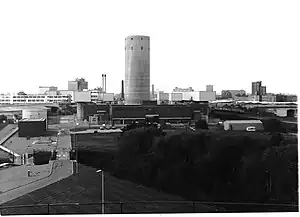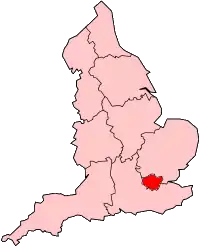| Bulls Bridge Power Station | |
|---|---|
 Bulls Bridge OCGT | |
| Country | England |
| Location | Greater London |
| Coordinates | 51°30′07″N 0°24′32″W / 51.50200°N 0.40900°W |
| Status | Decommissioned and demolished |
| Commission date | June 1981 |
| Decommission date | 1993 |
| Owner(s) | Central Electricity Generating Board (1980–1990) Powergen (1990–1993) |
| Operator(s) | As owner |
| Thermal power station | |
| Primary fuel | Gas oil |
| Chimneys | 1 |
| Power generation | |
| Units operational | 4 × 70 MW |
| Make and model | Rolls-Royce Olympus gas turbine |
| Units decommissioned | All |
| Nameplate capacity | 280 MW |
| Annual net output | 4.697 GWh (1985/6) |
| External links | |
| Commons | Related media on Commons |
grid reference TQ104793 | |
Bulls Bridge Power Station was a 280 MW open-cycle gas-turbine power station at Bull's Bridge, Hayes in west London. It was decommissioned in 1993 and later demolished.
History
The station was built, owned and operated by the CEGB as a stand-alone open cycle GT station and was commissioned in June 1981[1] but was later mothballed. It occupied a 25-acre (100,000 m2) site on either side of Yeading Brook, to the south of the Paddington main line and north of the Grand Union Canal, at its junction with the Paddington Arm.
Plant
It was built as a peak lopping and rapid response plant to augment base load generation.[2] It had a total generating capacity of 280 MW.[3][4] It comprised four 70 MW generator sets each one being powered by four industrial Olympus gas generators, two at either end of the central alternator.[2] It was connected electrically to the North Hyde 66 kV substation. By 1989 the gross capability was given as 3 x 70 MW plus 1 x 35 MW.[1]
Bulls Bridge typically ran at full power for intervals of 10 minutes to 1 hour.[2] As a result of the UK miners' strike (1984–1985) the station was re-opened in the 1980s,[3] During the year ending 31 March 1986 Bulls Bridge supplied 4.697 GWh of electricity, it's thermal efficiency was 20.02 per cent, and the load factor was 0.5 per cent.[5]
Design
The design of Bulls Bridge power station was of sufficient merit that the Royal Institute of British Architects (RIBA) commissioned a set of photographs of the station.[6]
Monitoring
The operation of the gas turbines and the rest of the plant was closely monitored. Key operating parameters of the station's gas turbine engines were as follows.
| Engine parameter | Working range |
|---|---|
| Low pressure spool speed | 6200 – 6500 rpm |
| High pressure spool speed | 7100 – 7700 rpm |
| Low pressure compressor exit temperature | 365 – 385 K |
| High pressure compressor exit temperature | 530 – 590 K |
| HP compressor exit pressure | 750 – 790 kPa |
| LP compressor exit pressure | 195 – 220 kPa |
| Power turbine entry pressure | 210 – 270 kPa |
| Power turbine entry temperature | 750 – 875 K |
| Fuel flow | 45 – 65 MW |
| Intake depression | 0 – 34.5 kPa |
| Vibration | All values |
Closure
On privatisation, the station was owned and run by Powergen, and ceased generating in 1993.[3] The site has since been redeveloped and the station demolished. The western parcel of land is occupied by a British Airways engineering centre.
References
- 1 2 Electricity Council (1989). Handbook of Electricity Supply Statistics 1989. London: Electricity Council. p. 8. ISBN 085188122X.
- 1 2 3 4 Addrison, K. N.; Hill, M. L. G. (1983). "Condition Monitoring at Bulls Bridge Power Station". Volume 5: Ceramics; Structures and Dynamics; Controls, Diagnostics and Instrumentation; Education; Process Industries. doi:10.1115/83-GT-144. ISBN 978-0-7918-7955-9.
- 1 2 3 "Table 3.7 - Generation Disconnections since 1991". Seven Year Statement. National Grid. 2009. Archived from the original on 8 May 2003. Retrieved 11 May 2009.
- ↑ "Electricity Generation". Hansard HC Deb 13 February 1978 vol 944 cc21-2. 13 February 1978.
- ↑ CEGB Statistical Yearbook, 1986, CEGB, London
- ↑ RIBA (1979). "Bulls Bridge Gas Turbine Power Station". Retrieved 11 November 2023.
